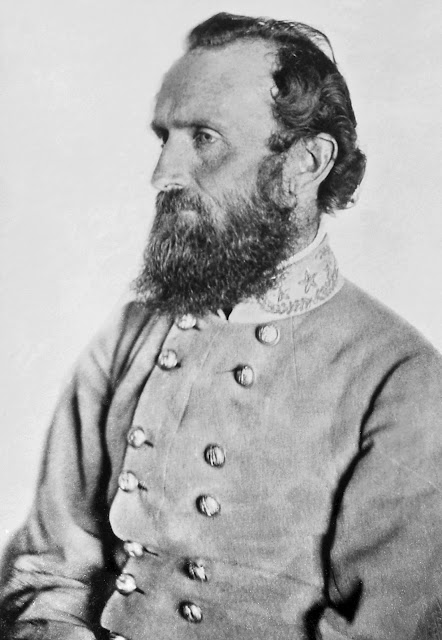Pen Portrait of Stonewall Jackson
“Stonewall Jackson had dark gray eyes full of strength and depth of expression. They seemed to look through a man and discern his thoughts at a glance.” ~ Colonel William C. Oates, 15th Alabama
William C.
Oates is best remembered today by Civil War buffs for his role in the fighting
at Little Round Top at Gettysburg on July 2, 1863. Oates served several years
in the Army of Northern Virginia and had the opportunity to interact with General
Thomas J. “Stonewall” Jackson on numerous occasions. He related these events
and his memories of the redoubtable Stonewall in a letter to a fellow
Alabamian, General Alpheus Baker, in 1890.
“I first saw
him in the fall of 1861 soon after he was sent with his division to the valley
of Virginia,” Oates wrote. “He looked awkward on horseback because he rode with
short stirrups, but on foot he was full six feet high, square-shouldered,
slightly round, and would have weighed about 170 pounds. He had a full brown
beard, straight nose, high forehead with black hair, which was thin, nearly to
baldness on the top with dark gray eyes, full of strength and depth of
expression. They seemed to look through a man and discern his thoughts at a
glance. On foot he was really a handsome man.”
“His voice was
effeminate and cracked like an old woman’s,” Oates continued. “For instance, he
would say, ‘I can’t excuse you, sir, I can’t excuse you.’ He always spoke
politely but firmly and to the point. At the close of the valley campaign of
1862, he assembled a general court martial and appointed me judge advocate of
it. This brought me in personal contact with him and I had the advantage of
personal interviews with him on two occasions. He decided very quickly on every
question and the reasons for it but did not seem impatient. He was a good listener
and as soon as the point was fully presented, he would decide the matter
calmly, but with such determination and repetition as at once struck the petitioner
with the idea of its finality, and from which there was no appeal.
“He refused a
request, if at all, politely and very quickly and with such impressiveness that
no man had the temerity to ask him to overrule his decision,” Oates said. “A look
came from his penetrating eyes which showed you unmistakably that the answer
came from his very soul and was irreversible. During the sitting of this court
martial, I walked out in the woods one day and not dreaming he was near, I
heard a man and turned to look and about 40 steps distant was General Jackson
on his knees, alone, and praying aloud.”
During the
second day of the Second Battle of Manassas, Colonel Oates spoke with General
Jackson again. “When Co. A of the 15th Alabama killed a Federal
major who, leading his regiment, tried to charge his horse through the ranks,
General Jackson came up to the spot,” Oates wrote. “He heard the captain
rebuking his men saying, “You should have captured him, he was too brave to
have been killed.” Jackson promptly replied, “No captain, your men are right.
Kill the brave ones, they lead on the others.”
“One day when we were on the march going into Maryland, he was riding from the rear forward and passed a regiment from which the men were straggling and depredating the orchards. He rode alongside the major in command and addressing him very politely inquired, “Major, are you in command of this regiment?” The major replied with a low bow, “yes, General.” Jackson asked, “Well Major, do you know the position of an officer in arrest?” The major replied, “I think I do, General.” Jackson said, “Well, you just take that position, Major,” stuck the spurs to his horse, and went through the woods in a swift gallop. The men along the line whooped and yelled, which they invariably did whenever he appeared in memory of the glory of his achievements.”
“Stonewall Jackson: Personal Traits of the General Recalled
by Congressman Oates,” Western Veteran (Kansas), July 16, 1890, pg. 2











Comments
Post a Comment